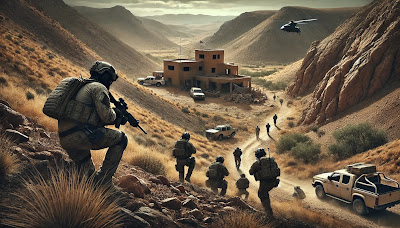 |
| Stealth in the Shadows: CIA operatives close in on a hidden terrorist hideout, executing the covert 'Third Option' in the heart of rugged terrain. |
When it comes to handling international
crises, the United States tends to stick to two main paths: diplomacy or
military might. The State Department takes the lead when there’s hope for a
peaceful solution, and we rely on our diplomats to wine, dine, and negotiate
with foreign officials to hash out agreements that hopefully avoid conflict.
And when diplomacy fails? Well, that’s
when the Pentagon rolls up its sleeves and gets ready to deploy the largest,
most advanced military the world has ever seen. But there’s a lesser-known
option—a shadowy, covert choice—known as the third option.
The CIA’s Special Activities Center (SAC)
is at the heart of that third option. This isn’t a group of diplomats in fancy
suits or soldiers in standard-issue fatigues. These are operatives trained to
blend into their environment, whether it’s a crowded market in the Middle East
or the rugged terrain of the Hindu Kush. They’re not looking to make headlines,
and you won’t see them in front of a camera. When they show up, it’s because
open military action would be too risky, and diplomatic solutions have run dry.
They operate in the shadows, handling the missions that require stealth,
precision, and absolute deniability.
The SAC was crucial in Afghanistan, long before U.S. troops stormed the country. Just 15 days after the attacks on the World Trade Center, SAC operatives were already on the ground, gathering intelligence, building local alliances, and laying the groundwork for what would become America’s longest war.
That’s what makes the third option so
powerful. It allows the U.S. to shape global events without making a full-blown
military commitment or putting boots on the ground for the world to see.
Sometimes, you need to topple a government or eliminate a high-profile target
without igniting a global firestorm. That’s when SAC steps in, handling
delicate situations that could go sideways if the public knew the details.
One real-life example of the third option
being used to America’s advantage was during the 1960s Congo Crisis. The
country, newly independent from Belgium, was teetering on the edge of chaos,
and a communist-leaning leader, Patrice Lumumba, posed a threat to U.S.
interests.
Fearing Soviet influence in the heart of
Africa, the CIA initiated covert action through what would eventually evolve
into SAC. Though the full details remain classified, the agency's covert
operations played a significant role in reshaping Congo’s political landscape,
ensuring a more favorable outcome for U.S. interests without direct military
intervention. The third option allowed the U.S. to protect its strategic
interests in the region without having to publicly engage in military action or
risk a diplomatic nightmare.
What makes SAC operatives so effective is
their training. These aren’t your average field agents. SAC personnel undergo
some of the most grueling physical and psychological training imaginable. Many
are recruited from elite military units like the Navy SEALs or Delta Force.
They’re trained in parachuting, survival,
and guerrilla warfare, but they also have to be skilled in blending into
civilian life, gathering intelligence, and executing missions in some of the
most hostile environments on earth. They’ve got a unique mix of tactical and
covert skills, making them America’s secret weapon when a problem needs to be
solved quietly.
The Special Activities Center plays a
vital role in our national security. As the world becomes more complex and
unpredictable, there will always be situations where diplomacy won’t work, but
open military action would be too risky. That’s why the third option will
continue to be crucial for safeguarding America’s interests.
Now, I want to hear from you. What do you think about the third option? Do you believe it’s a necessary part of U.S. foreign policy, or does it pose too many risks? Feel free to post your thoughts in the comments below. Let’s get the conversation started.
Robert Morton is a member of the Association of Former Intelligence Officers (AFIO) and the author of the "Corey Pearson- CIA Spymaster" spy thriller series. Check out his latest spy thriller, Misson of Vengeance.






No comments:
Post a Comment